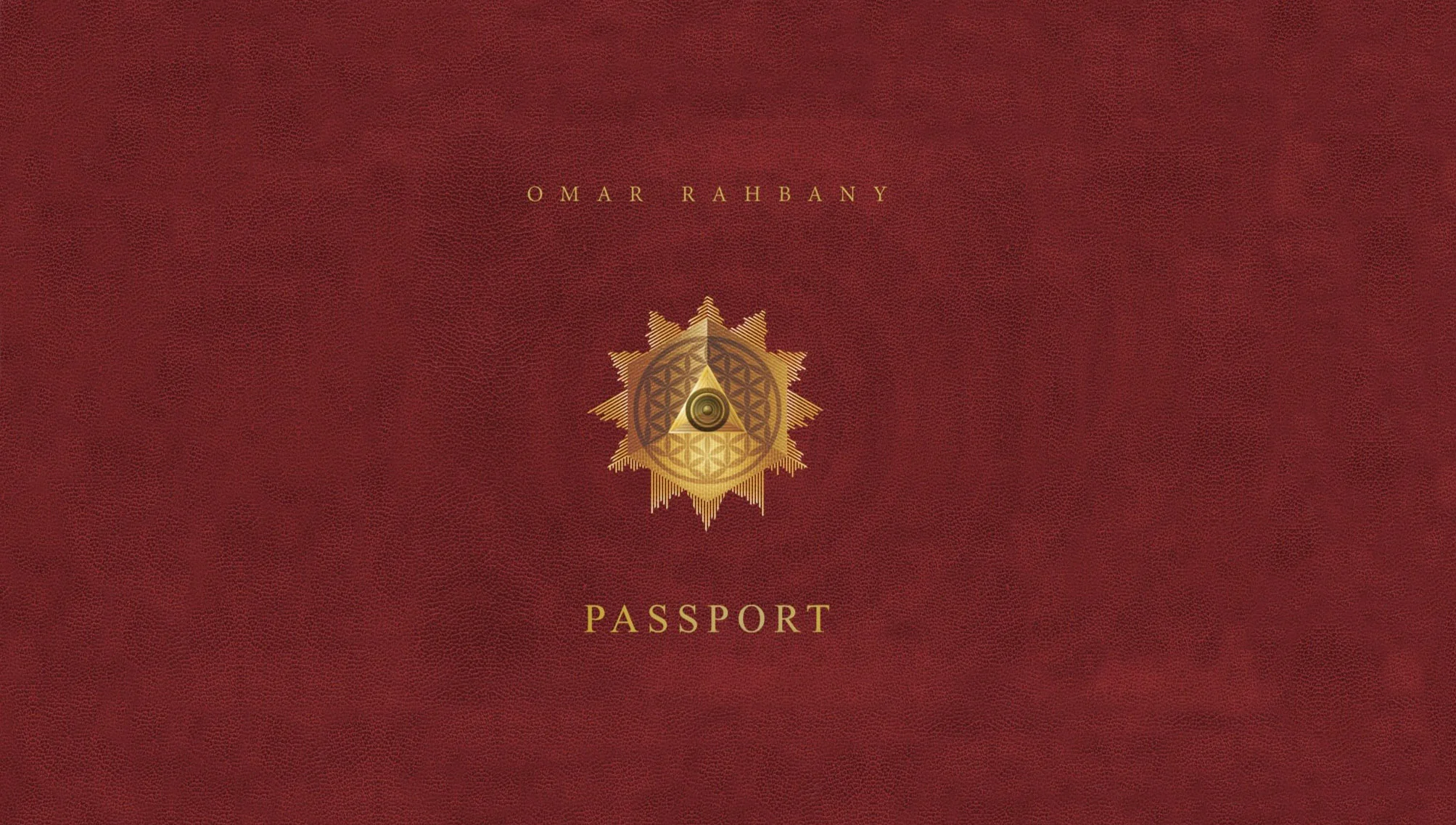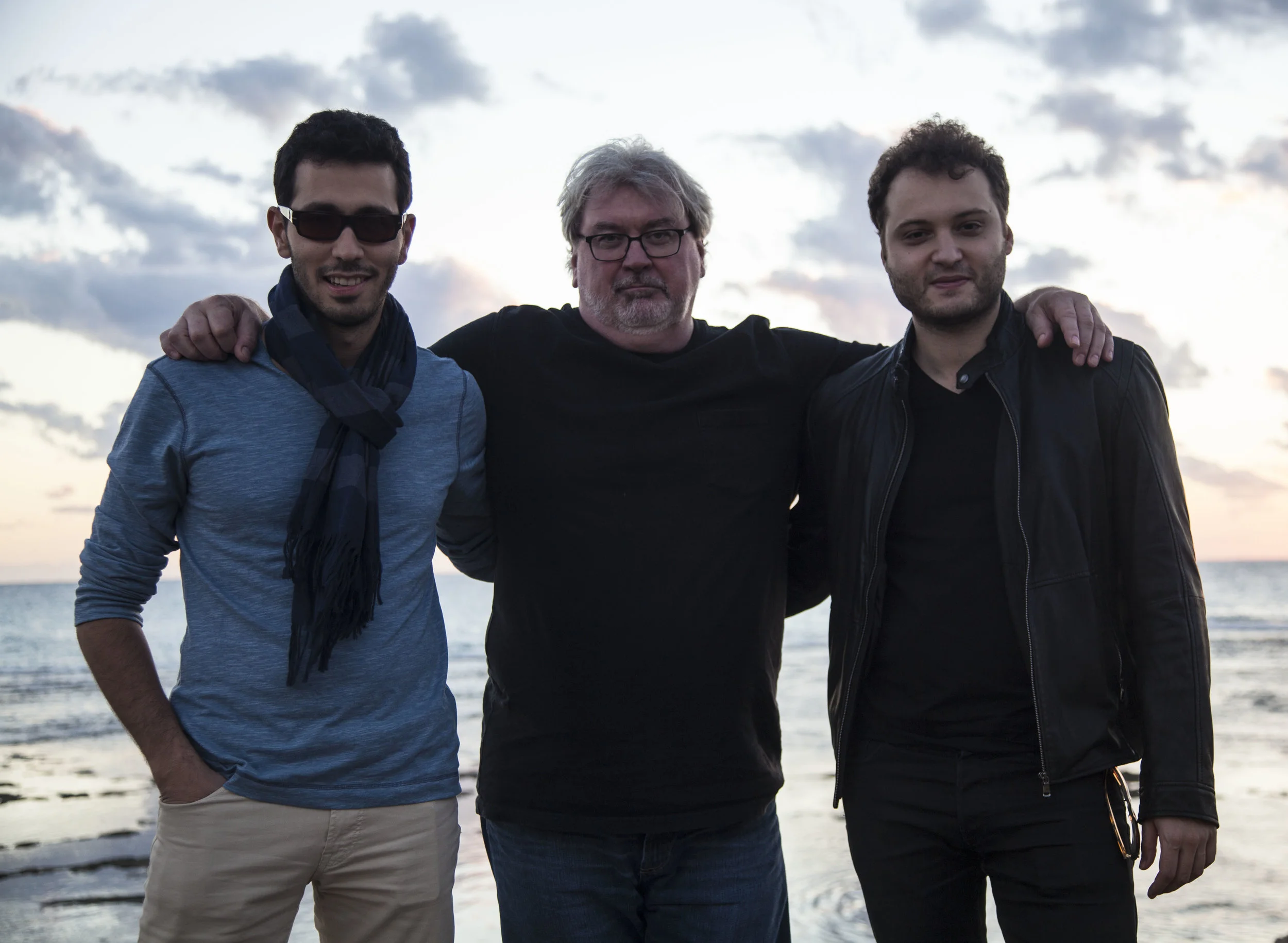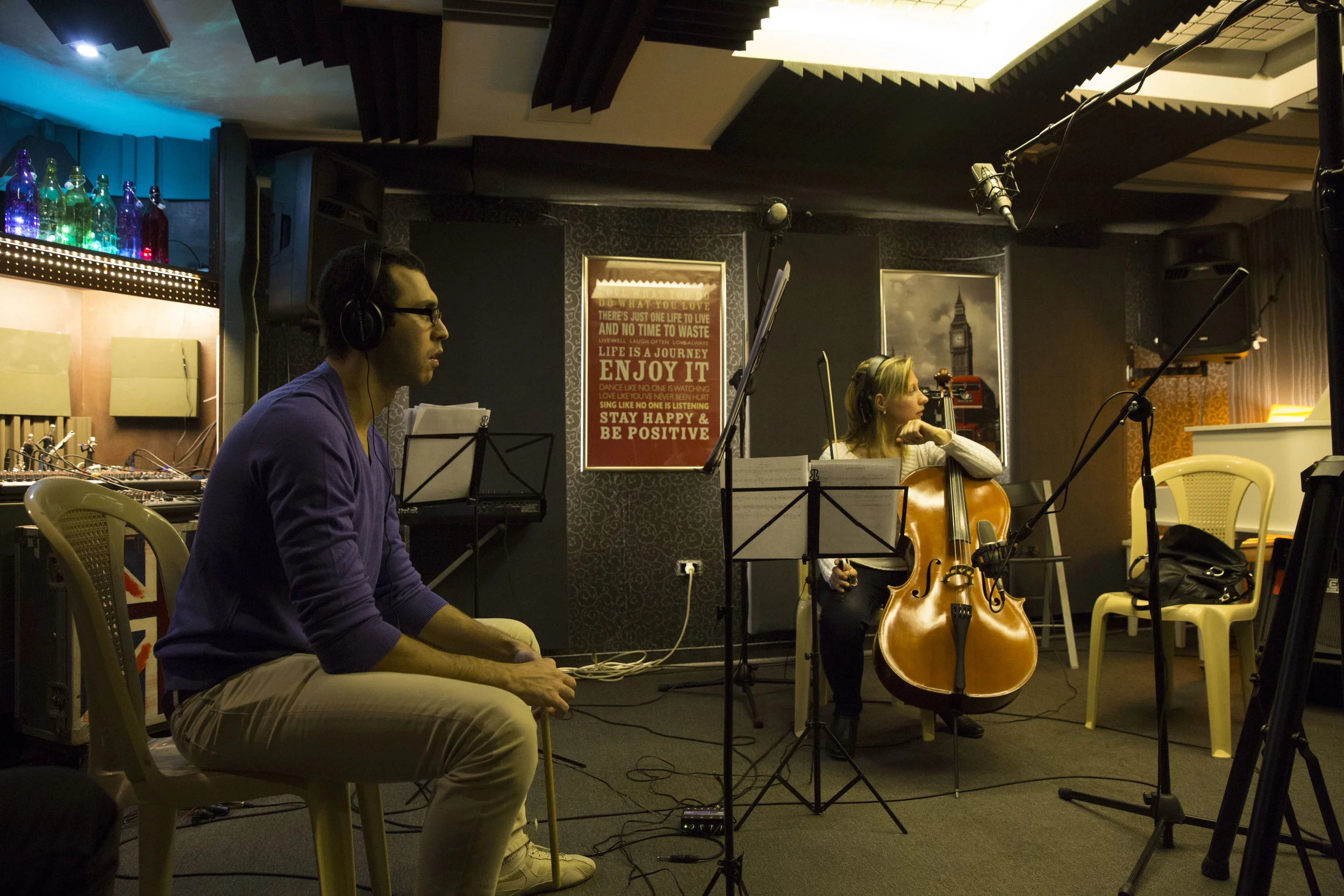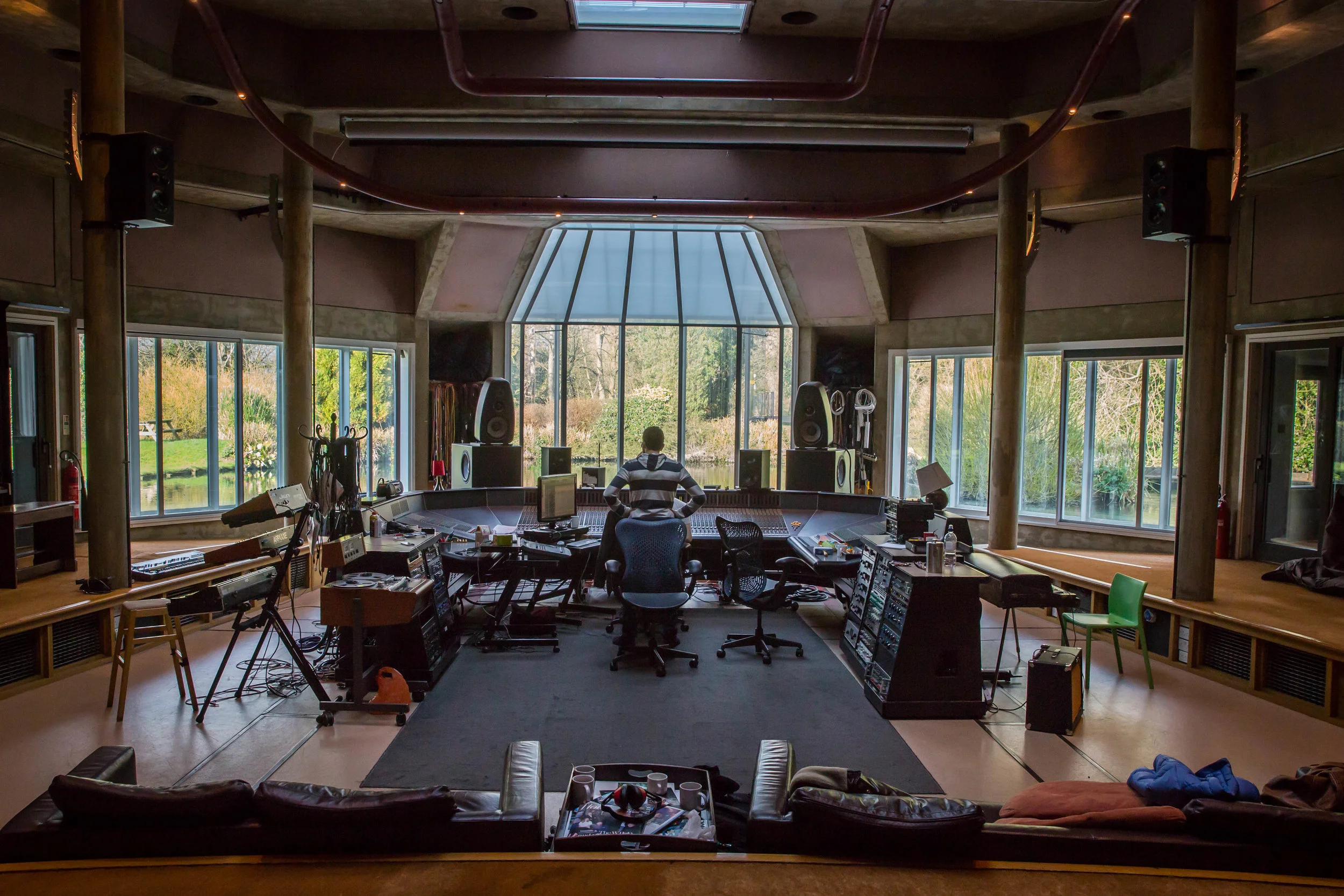In Search of a Passport
by Ceem Haidar
This work appears in Khabar Keslan Issue 1. DISORIENT
Passport’s album artwork. All photos courtesy of Omar Rahbany, Ceem Haidar, and The Commery.
Omar Rahbany’s latest album embodies the chaos of identity.
Allow me to share with you a story that pertains to a loss, says 27-year-old musician and composer Omar Rahbany.
I was at school, at the age of fifteen, seated in French class, and our teacher began the lesson with these words: “We should be proud to be Phoenicians, we invented the alphabet, we excelled at business, and we spread our culture to the world.”
Throughout the semester, she couldn’t help but express her love and pride to be Phoenician at every possible opportunity. I found that I was easily manipulated by her hypnotic voice. I took hold of this notion, and became proud to be Phoenician.
A few days later, Professor Fares, our Arabic teacher—who looked like a true Arabic knight straight out of a children’s storybook—went on another tangent about living in what I call ‘declamation mode.’ For him, without the shadow of a doubt, we are Arabs. And seeing him act with an unparalleled level of confidence, I was easily convinced to believe the same.
But I was in a Catholic Totalitarian school, and so our identity had to have traces of Christian teachings. This was confirmed when Father Emmanuel said: “Good people, we are first and foremost Christians!”
Period.
Diplomacy was not evident in this statement, but it was one that most of us in school could agree with.
Then one day, our geography teacher came into class. He was also keen to influence our minds and identities. He proclaimed: “We are Not Phoenicians, Not Arabs, Not Christians, we are Lebanese and our force comes from the Cedars.”
I recall that on that day students suddenly transformed from football lovers into enthusiastic patriotic civil servants, ready to shed blood for their nation.
Story after story, my now skeptical mind realized that it was easy for any charismatic speaker to convince us of anything..
With so many to latch on to, I left the class feeling lost.
There was only one man who could put an end to this internal conflict. Our history teacher.
I looked for him, searching around the campus, and then finally found him. He was kneeling down, anxiously looking for something on the floor.
“Sir, anything I can help you with?” I said.
He replied: “Omar, I have been looking for my ID card all day long but I still haven’t found it. It looks like I have lost my identity.” His last sentence rung like huge cathedral bells on a crowded Sunday morning mass.
I said to myself, “not only sir, have you lost your identity card, but a whole generation are indeed lost with this question of identity.”
•••
When we first met, in May of 2016, Omar’s wide smile showcased the upper row of his teeth, shining through his untamed hair and stubble. An observant stare peered at me over the rims of his dark rectangular glasses, melding well with his casual attire and air. He was looking for someone he could trust to help convey the complex vision contained within his first album, ‘Passport,’ which he hoped to present to a global audience. Admittedly, he struggled with staged human interaction—part of the reason why he reached out to me to launch events and press interviews. He kept placing his iPhone on the office table, picking it up and putting it back down throughout, shaking his leg repetitively, and glancing around, assessing the space.
Throughout our meetings, it became apparent to me that Omar knew music so well that, sometimes, he even saw musical notes in the world around him. As a result, though, he hadn’t taken the time to brush up on other skills that he found to be less important, such as being diplomatically correct—which was necessary for general social interactions. He also had the habit of incessantly questioning his identity, and while he thought about this often, he hardly cared to elaborate verbally on the matter. He said what he needed to say, and then otherwise observed.
He remained cautious in our first few encounters. He shared only small parts of ‘Passport,’ as though testing the waters to see if I could understand the ‘Gesamtkunstwerk’ of the album—a German concept meaning a ‘total work of art.’
Every now and then, he would switch on his iPad and play the album trailer as a sort of explanation; it never failed to inspire. He was the kind of guy who was hands on with every piece of information that had to do with him or his work, dictating it word for word, frame by frame, if he needed to (which in most cases, he did), reflecting his talent in composition. His attention span remained short, but he always guided the conversation by referencing a to-do list on his iPhone, which he pulled close to his face to bring into focus.
Omar Rahbany (left) with Steve Rodby (center) and Mahdi Yahya (right).
•••
After a few challenging introductory meetings, plans to launch ‘Passport’ in Beirut in October of 2016 were underway.
Our meetings sometimes spanned two to three hours, but always ended abruptly. Omar candidly shared personal stories about his childhood, family, and the community he was born into. He did not care to filter the information he shared, sometimes smiling passionately, other times grinning—perhaps thinking of something completely off topic—or frowning, growing angry. His hand gestures always mimicked his emotions.
One of the most crucial stories Omar shared was of the source of his talent. While his professional debut is recent, his craft predates his own birth.
“My father forced my mother to continue her piano lessons so I would hear it in the womb,” he divulged. After all, he was born into an artistic family.
The Rahbanis, of Lebanese origins, are credited for their contributions to the world of music and theatre from as early as the 1960s. They have been dubbed the ‘Shakespeares of the Arab world.’ Omar’s grandfather Mansour and his brother Assi, his father, mother, uncles, and great aunt—the renowned singer Fairuz—all have beats and theatrical scripts flowing through their veins, a desire to be on stage or in a recording studio burning within each of them.
Omar is no different. He followed closely in their footsteps, but is nonetheless determined to carve his own way and challenge what has been done before. “From a young age, my father set us on a creative path. Toys were replaced with a piano, bicycles with a camera,” Omar recalls. When probed if it was a ‘normal’ childhood, he shared that that was the norm within which he grew up.
Today, his room is fully equipped to inspire, with a blue rotating chair situated between two keyboards. His desk is completely covered with CDs, papers with scribbled notes, half-finished symphonies, and select sleek electronics. Somehow, this confined space allows him to dream without limitation.
Omar Rahbany (left) in Ray’s studio.
His room mirrors the chaos of the world—an element that Omar thrives on, extracting creativity from the disorder that surrounds him. He recounts a story from when he was five, remembers being fascinated by the pipes and strange structures of the power plant near his house that pumped thick black smoke into the clear blue sky. He created a track on the album entitled ‘Zook: The Power Station’ about this factory. The memory embedded within the song resonates with his contemplations of the darkening world. For Omar to exist in such a polluted world, he had to adopt a child-like imagination.
‘Passport’ took Omar three years to create. At first, he embarked on the journey alone, and then brought together over 180 individuals from 12 nationalities to collaborate with him. Each of the ten diverse tracks features a different texture. The team includes critically acclaimed artists like fourteen-time Grammy award winning producer Steve Rodby, who supervised the entire production of the album, Keith Carlock (Steely Dan, Sting), Wayne Krantz, Cuong Vu (Pat Metheny Group), Karim Ziad (The Zawinul Syndicate), as well as a selection of superb local musicians.
Anarkia by Omar Rahbani. Vocals: Loyal El Mir Piano: Omar Rahbany Clarinet: Trad Trad Flute: Rami Maalouf Buzuk and Oud: Faraj Hanna Arabic percussion: Raymond Hage Brazilian and miscellaneous percussion: Christopher Michael Male Chorus: Gilbert Jalkh and Tony Azar.
Drawing inspiration from philosophy, natural science, and the arts, each of the tracks delivers comple, liminal sounds, from jazz chords, to classical Arabic ensembles, and to boistrous yet intricate percussion sections. The album begins with an overture performed by the Kiev Philharmonic Orchestra, which injects a classical intonation and discipline. Keith Carlock infused the track ‘Programmusik: Babel’ with a funky New Orleans feel, delivered with a guitar number. Some tracks have pure Arabic influences running through them, such as the track such as ‘Anarkia.’ The track boasts some notable Lebanese artists telling the story of a young man who only believes in belonging to planet earth—with no concern for religion, nationality or other affinities. ‘Anarkia’ has punchy vocals and solid beats, perhaps unsettling for the average listener. ‘Muwashahat,’ too, is influenced by Arabic culture: it is based on a poem written by Ahmed Ben Hassan Al Mousally. Omar’s grandfather handed him the poem before he died, suggesting that Omar create a piece based on it. The poem is about love, so Omar decided to turn it into an ‘audible wedding,’ ending the track with fireworks. These sounds can also be heard as AK-47 bullets grazing the sky; celebratory gunfire is prevalent in Arab cultures.
Omar Rahbany (center) in Real World Studios, UK
The track ‘Umbrella Woman’ tells the story of an older woman in love with a much younger man who drove her crazy. Complimentary notes, which almost come off as background music, accompany the powerful narrative at the forefront. The track ‘Tango,’ based on sound design, builds on the cinematic scope that Omar sought to create on ‘Passport.’ It begins with the sound of a door creaking open, followed by footsteps of what one could imagine to be a slender woman, in heels, making her way to meet her lover. Each of the pair takes turns at being in control and the track comes to an end with the subtle laugh of a woman.
Other sounds on the album hail from around the world and include Jazz, Brazilian music, Argentinian tangos, Latin American rhythms, as well as Indian Konnakol – all sounds that were integrated into Omar’s childhood growing up in an animated home.
After completing the album, Omar pondered what the three-year journey was all about. “Passport deals with an identity crisis that finds its remedy in reinventing the concept of identity. It is an insight into how humans are in constant evolution and change.” Through the creative process of constructing ‘Passport,’ Omar inched closer to resolving his own identity crisis.
“I decided to recreate my own existence,” he confidently shares. “I started by saying to myself that I am a citizen of planet Earth and my nationality is that of a human being. This is my Passport.”
Passport was launched in Beirut, Lebanon, in October 2016 and in London, UK, at the Royal Court Theatre in April, 2017. Passport is available for streaming and download on iTunes, Amazon, Anghami, Spotify, Apple Music, Deeper and many other platforms.
Ceem Haidar (pronounced Seem) is the Co-founder and Managing Partner of The Commery, a communications consulting firm based in Beirut. She majored in Communications Arts, where she headed the first daily university newspaper in the Middle East. Her career path began in journalism, shifted into Public Relations at a multinational firm and then led her to the Big4 corporate world. But she wanted ‘more,' which led her to set up the communications consultancy at 26, while concurrently teaching at University. For as long as she can remember, she has been curious, exploring the world around her and documenting it via writing, painting, photography, and deep discussions.




